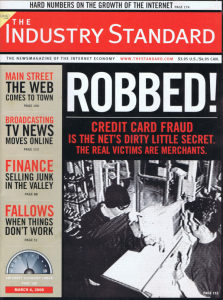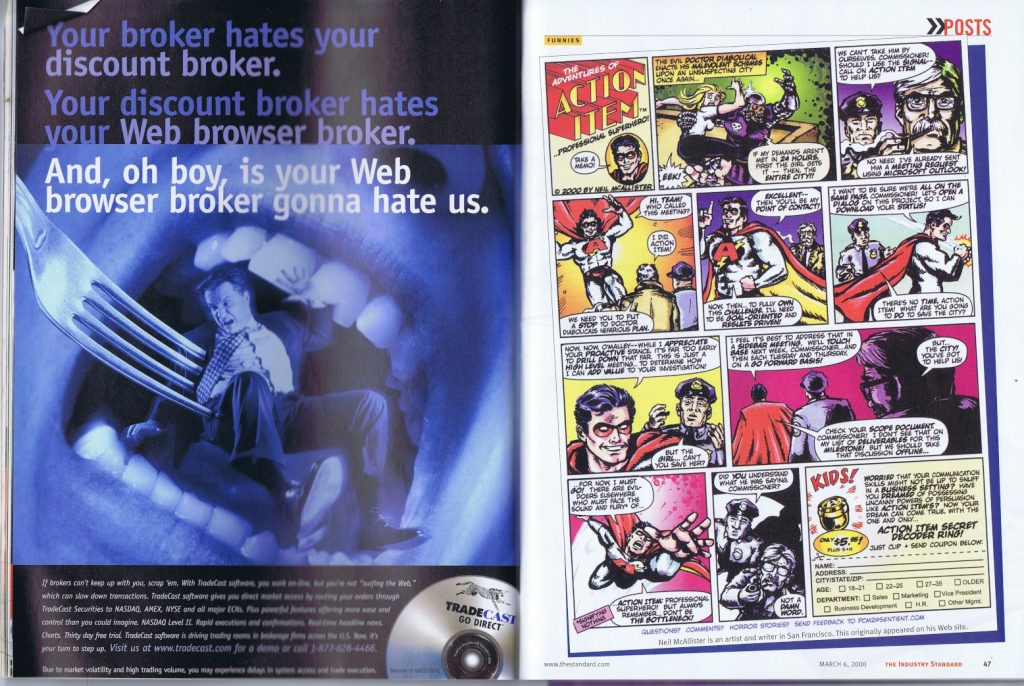 If you weren’t around 20 years ago to experience the original dot-com boom, you probably don’t remember a print magazine called The Industry Standard. To understand the full, bizarre history of this awful rag will require someone with more inside knowledge than myself to explain. Believe it or not, though, it was considered “the paper of record” for the Silicon Valley tech industry, back in the days when people weren’t laughed out of conference rooms for having the job title “Webmaster” listed on their business cards.
If you weren’t around 20 years ago to experience the original dot-com boom, you probably don’t remember a print magazine called The Industry Standard. To understand the full, bizarre history of this awful rag will require someone with more inside knowledge than myself to explain. Believe it or not, though, it was considered “the paper of record” for the Silicon Valley tech industry, back in the days when people weren’t laughed out of conference rooms for having the job title “Webmaster” listed on their business cards.
I was strongly encouraged to write for this magazine several times while it was still around. It and its counterpart, the equally odious Red Herring, were covering the investment angle of the industry, which meant there was certainly more than enough money to throw around. And yet I never bit, with but one exception — coincidentally, exactly 20 years ago this year.
Why wasn’t I into it? Well, the obvious answer is that all this stuff was gross to me. I didn’t know anything about investing in tech stocks and I didn’t want to know. I knew how to write about technology. I didn’t know how to convince your dad to invest in some startup that just got acquired by Hewlett-Packard.
Second, when I say there was “more than enough money,” what I really mean is that there was too much money. There was this rule about print magazine publishing, where for each X pages of ads you ran, you also needed to run at least an equal number of pages of editorial. If you failed to do so and you had more ads than editorial, you were disqualified from the U.S. Postal Service’s second class postage rates, because you were considered a catalog, rather than a genuine magazine.
To put this into perspective, the largest issue of the Red Herring that I ever saw was almost an inch thick. And as Wikipedia says of The Industry Standard (emphasis mine):
Beginning in 1999, The Standard began selling a large number of advertising pages in the magazine, and began to be referred to as “the bible” of the Internet economy. In 2000, it sold more ad pages than any magazine in America, and launched that year a European edition.
In other words, the ad money was pouring in, and because The Standard was hardly going to turn any of that cash away, it was absolutely desperate for any kind of editorial it could get its hands on, so it could keep claiming it was a magazine. As one editor confided in me at the time, “They’ll print anything.”
And so, sometime in late 1999, I got into talks with somebody at The Industry Standard to publish my one-page comic strip, The Adventures of Action Item, which had gone viral on the internet a year or so earlier. You can read some more about how that came about on the now-dusty official site, but suffice it to say it ended up being printed on page 47 of the March 6, 2000 issue.
I seem to remember they screwed it up somehow. I think I had sent them a printed version stapled to my contract, just as documentary evidence, and they chose to scan that low-res sheet and run the scan, rather than using the digital files I sent over in the same envelope.
I suppose I could also comment on how a magazine that boasted about “hard numbers on the growth of the internet” gave over this issue’s cover almost entirely to phrases like “selling junk in the Valley,” “when things don’t work,” “the net’s dirty little secret,” “the real victims,” and “ROBBED!” — but to be perfectly honest, back then things were still looking rosy. The dot-com implosion was still months away.
The Industry Standard would file for bankruptcy in 2001. I seem to recall the last issue ran instant ramen recipes for tech startup dudes who had recently lost their jobs (or maybe that was Red Herring?) Right now I’m told the Industry Standard brand lives on (somehow) within InfoWorld, my old alma mater.

